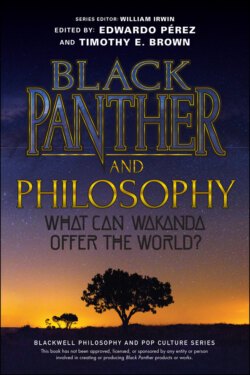Читать книгу Black Panther and Philosophy - Группа авторов - Страница 35
4 “What Would You Have Wakanda Do about It?” Black Panther, Global Justice, and African Philosophy
ОглавлениеChristine Hobden
KILLMONGER: You know, where I’m from, when Black folks started revolutions, they never had the firepower or resources to fight their oppressors. Where was Wakanda? Hmm? Yeah, all that ends today.
The world presented in Black Panther, although fantastical, is, for the most part, the world we currently inhabit: a deeply unjust one. This injustice and inequality is experienced between members of a society as well as across societies and states. While Killmonger, the villain, is pitted against T’Challa, the hero, Killmonger’s tragic backstory generates sympathy or at least understanding given the injustice he learned as a boy. The racial injustice Killmonger experienced in 1991 Oakland, California, resonates deeply with experiences of contemporary Black Americans, as illustrated in the resurgence of the Black Lives Matter movement. This is an example of injustice within a particular society. Killmonger’s quest also highlights international injustice and inequality: why did he suffer because he lived in one state and not another? What was so significant about state borders that Wakanda was willing to ignore the injustice experienced in other states? These questions of global justice are profoundly relevant today. We can think here, for one example, of the vastly unequal distribution of COVID-19 vaccines globally, leaving those in the Global South without “firepower or resources to fight” this common enemy.
So, Black Panther’s narrative offers significant commentary on the issue of justice, and, as we’ll focus on in this chapter, global injustice in particular. Indeed, a core question running throughout the movie, is “what would you have Wakanda do about it?”
This is not an easy question to answer, especially since the characters of Black Panther present conflicting perspectives – Nakia wants Wakanda to offer aid to the world; W’Kabi believes refugees bring their problems with them; T’Challa initially believes that it is not his place to offer justice to the world; and Killmonger wants to use Wakandan technology to liberate oppressed Black people throughout the world. But is this how we should look at justice? Should studying justice only focus on how we (or nations like Wakanda) respond to injustice? Or are there other ways to view the issues of justice and injustice? What does justice/injustice really mean?
As we’ll see, through the debate on how Wakanda should respond to global injustice, Black Panther illustrates various issues regarding the nature of justice and the types of injustices we can inflict upon one another. We’ll also see, however, that the film does not approach these questions from the perspective of the African philosophies; philosophies that the characters would’ve likely engaged with through the roots of their language and culture.
